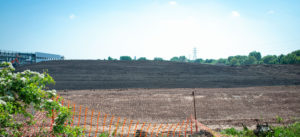UK companies that buy contaminated land for development could be able to claim Corporation Tax relief of 150% through Land Remediation Relief.
Although the relief was introduced in 2001 (with an update in 2009) many people are unaware of the tax break. The UK government originally introduced the incentive to help return contaminated or derelict land to use.
Latest figures show that brownfield land accounts for almost 10% of land in England alone. Indeed, a report by the Campaign to Protect Rural England states that 27,000 hectares of brownfield sites currently stands empty. And it says that using those sites would be enough to build more than 1.2 million homes.
That means brownfield sites could provide more than 80% of the land required to meet the current UK government’s housing target. And that would mean protecting a massive amount of grey and green belt land, which it is aiming to use as part of its ambitious plans.
Brownfield sites are a clear answer to future housing developments. But the biggest issue is that many are contaminated with a range of materials. Many industrial sites are expensive to bring back into use if traditional remediation methods are employed. And then there’s the risk associated with such sites.
What is Land Remediation Relief
The Land Remediation Relief incentive helps to address the issues. The incentive is available to companies that buy contaminated or derelict land in the UK from a third party. It can also apply to non-UK resident companies that have a UK property business or other sourced property income.
Such companies can claim an enhanced reduction of 150% for certain expenditure categories for remediating the contaminated land and bringing it back into use. These costs can be either capital or revenue. The relief includes expenditure relating to staffing, professional fees, materials and some sub-contracted costs.
To qualify for the tax relief, a company must also hold a “major interest” in the land or property. That means the company should own the freehold or have a minimum seven-year lease.
The relief only applies if the company involved was not responsible for causing any of the contamination or dereliction. For example, if you bought land which included a serviceable building that you subsequently allowed to become derelict, you would not be able to claim Land Remediation Relief.
How does it reduce Corporation Tax
For companies with a taxable profit, the expenditure of cleaning up the site can be deducted from the company’s profit. This reduces the corporation tax liability. The total relief is 150% of the expenditure. So, if the qualifying spend is £100,000, the deduction of an additional £50,000 would be added to the initial spend. The main rate of Corporation Tax is 25%, so the total enhanced qualifying expenditure would mean a tax saving of £37,500.
Companies that are not profitable may surrender its tax loss for cash for a 16% tax credit.
What qualifies as contaminated or derelict land?
To qualify for Land Remediation Relief, the land must meet certain criteria. It must be in a “contaminated state”, which means the contamination is in or under the land and relevant harm is being caused. It must be shown that there is a serious possibility that there is relevant harm to living organisms, pollution to controlled waters, damage to ecosystems or significant damage or interference with buildings can occur.
The contamination must be caused by a result of industrial activities. But there is an exception for the presence of natural contaminants, such as arsenic, radon or Japanese knotweed.
It is also possible to claim the relief for ‘derelict land’, which is land that has not been productive since April 1998. There must also be buildings or other structures on site that must be removed to allow the land to become productive. This includes building foundations, redundant services underground, machinery bases or reinforced concrete pile caps.
How do I apply for land remediation tax relief?
If you believe your company could claim Land Remediation Relief, speak to your accountant or a tax expert. We can also help advise our clients and help them through the process of claiming the incentive. For more details, contact us today.









